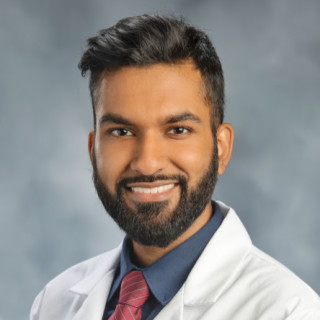I’ve been asked the question “why medicine” many times in my career but my response is never quite complete. The question, often posed to the fresh-faced and idealistic medical school or residency applicant, has almost no wrong answer — save one: the money. If I'm being honest, job security and financial stability did play a role in my decision to pursue medicine. As the child of immigrants who survived war and displacement, leveraged their education for survival, and made immense sacrifices for me to have every opportunity for success, I happily worked hard to make them proud. As a result, career paths with more risk were less attractive as compared to the regimented nature of medical training, which provides a clear professional track for one’s 20s.
Articulating this in the medical education environment, however, can be taboo. There is the obvious ethical implication; we are all in this profession for the patients first and foremost, and adding money into the mix muddies the water. Undeniably, my pursuit of medicine is rooted in service and giving back to the community, helping to heal patients, learning the intricacies of the human body, and supporting others in their most vulnerable times. This commitment was tested with the social life I sacrificed in medical school and the long hours I worked as a resident. But the notion that medicine is also a financially smart or lucrative career choice is often met with the valid reply that if you want to “get rich,” there are a hundred alternative career paths that will earn you money earlier and faster.
But I would argue that finances play a very significant role in every applicant’s decision to pursue medicine. Aside from following one’s dream of becoming a doctor for any number of honorable reasons, deciding to become a physician is arguably the biggest financial decision any student, especially one in their early 20s, will make. Medical school graduates who aren’t fortunate enough to have scholarships or liquid assets often add graduate tuition loans to existing undergraduate loans (which can total anywhere from a few thousand to half a million dollars). Then, when they enter years-long postgraduate training, burgeoning physicians can expect compensation comparable to minimum wage. This embeds young doctors in the $1.6 trillion student loan crisis that will shape their financial future for decades to come. Of course, the decision to endure such financial stress is made with the understanding that once training has finished, a career as a physician will allow one to earn enough to repay student loans and support a quality of life commensurate with the invested time and effort into one’s career.
However, the economy that modern graduates are entering is unprecedented, and our perspective and approach to the job search is very different from previous generations. As I near the end of my training, I am faced with the question of how and where I want to practice. As a millennial coming of age in this era of crippling student debt, the steady onslaught of private equity, and the corporatization of health care, I feel traditional medical training does little to prepare new physicians for the real-world challenges of navigating early career finances and employment. Students rarely learn what it means to be an independent practitioner; how to run an office or manage staff; how to navigate Medicare, Medicaid, and private insurance billing systems; how to negotiate contracts, compensation methods, and salaries; what an RVU is; how to evaluate different profit-sharing models, or how to address partnership and buy-ins. These topics are often marginalized, perhaps understandably given that the medical school curriculum already has significant material to cover. Much like other aspects of being a physician, it is expected that all of the aforementioned will be learned on the job.
When a resident/fellow completes their training, they are thrust into the ‘real world’ where they can be easily lost in the plethora of available employment options. Their future is no longer left to the mercy of the Match — and the freedom can be daunting. This is where millennials are different from previous generations. Millennials not only have a different mentality toward gainful employment, but are also entering a completely different market. They must navigate the nuances of opening/joining/buying a private office during a time when private equity and large health care conglomerates are consolidating these practices. Additionally, they must also weigh the financial implications of a private practice buy-in and partnership versus guaranteed salary and loss of autonomy.
In previous generations, many graduates would go straight into practice, often joining a doctor’s office in their hometown, perhaps taking over for a retiring physician. Doctors prided themselves on “being their own boss,” and making all of the decisions for their practice. But for some in the new “entitled” generation, the prospect of simply joining an organization as an employee with a guaranteed salary and less risk — opening a practice may require another loan, and the practice could fail; joining a practice risks sale of that practice to private equity before becoming a partner and having to add a buy-in to already staggering debt — can be inviting. Millennials are already renting for longer, with some preferring to skip homeownership altogether. Avoiding worry about the mechanics of running a practice, which allows a young doctor to focus on simply treating patients, can be very tempting. It is no surprise that millennials, with their unique financial burdens, may favor being employees over facing entrepreneurial challenges when it comes to finding a job. This leaves elderly retiring physicians at a loss. Without younger doctors to sell their practices to, private equity becomes a solution for funding their retirement.
Of course, there are many potential negatives to being an employee aside from loss of autonomy. In our capitalist society, it is important to consider competing interests. When applied to health care, the private equity model is interesting. In overly simplified terms: the goal of the managing group is to ensure a profitable enterprise for its investors. How does this translate to running a medical practice? One would hope it means efficiency and profitability are maximized without compromising quality and ethical patient care. But whether this is, in fact, the reality, is a topic of ongoing debate. Is being an employee in such a setup really the best option for new graduates?
Health care in the U.S. is far from perfect and very expensive. As private equity and corporate health care consolidation models reshape the American health care landscape, we will all witness an effect on job prospects for new graduates — and on our ability to provide quality patient care while maintaining financial stability for doctors. Only time will tell how new graduates cope with these shifting tides, and how the new reality will shape the future of health care.
What has been your experience with private equity? Tell us in the comments.
Dr. Saaquib Bakhsh is dedicated to ending the healthcare disparities faced by our most vulnerable populations. His focus includes the interplay between race, socioeconomics, culture, environment, and public health. He was born and raised in Chicago where he earned bachelor's degrees in statistics and environmental sciences from Northwestern University. He completed medical school at Rush University and is currently in ophthalmology residency in Michigan. He is a 2020–2021 Doximity Op-Med Fellow.
Illustration by Jennifer Bogartz







